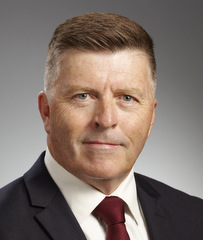New CEO for Ports Australia
The Hon. Michael Gallacher has taken up position as the CEO of Ports Australia.
 Gallacher's long standing interest and understanding of ports and shipping related issues, together with his widely acknowledged advocacy and policy development skills were instrumental in his successful application for the job.
Gallacher's long standing interest and understanding of ports and shipping related issues, together with his widely acknowledged advocacy and policy development skills were instrumental in his successful application for the job.
He was appointed Shadow Minister for Ports following the 2003 NSW State election, and from that time he has been the strongest advocate for the future growth and advancement of the industry. Through his career, Gallacher progressed into other areas of political responsibility, such as Industrial Relations, Police and Emergency Services, yet he has always maintained an interest and a preparedness to understand the challenges and opportunities affecting ports across the nation.
His list of achievements as a Minister highlights his ability to prosecute the need for policy change and then personally drive the negotiation and public debate process to achieve the required outcome, said Ports Australia in a statement. He has a proven track record of working with his Federal and State political counterparts across the political spectrum to achieve nationwide outcomes.
Vincent Tremaine, Chairman of Ports Australia, said “There is no doubt that Michael will build on the outstanding leadership and direction set by our former CEO David Anderson to drive the public profile of Ports Australia and to strongly advocate on the issues affecting the efficiency and development of our nation's shipping gateways.”
Australia’s port sector directly employs about 35,000 people, and about 20 percent of Australia’s GDP is underpinned by exports. China replaced Japan as the nation’s leading trading partner in 2008. Australia currently exports goods valued at over A$90 billion to China, mostly iron ore, coal and gas, and imports around A$60 billion of manufactured goods from China.
The Bureau of Infrastructure, Transport and Regional Economics estimates that sea trade will double in the next 20 years. Later this year, the government will consider a strategy report on how to boost the productivity of the freight supply chain, including cutting the costs of moving goods through major container ports. The new strategy will aim to eliminate bottlenecks from trade with Asia and support future growth in the agricultural sector.
The strategy is being developed at a critical time. In the face of growing city populations and associated congestion, Ports Australia wants to see the strategy to protect road and rail access corridors and shipping channels and ensure that port precincts are protected from conflicting land use plans.
Additionally, the privatization of Melbourne, the nation’s busiest port, was finalized last year, following similar deals with Port Botany, Port Kembla and Darwin Port.
Former CEO David Anderson will remain in his position in a part-time capacity during this transition period. He has served as Ports Australia’s CEO for 10 years.
